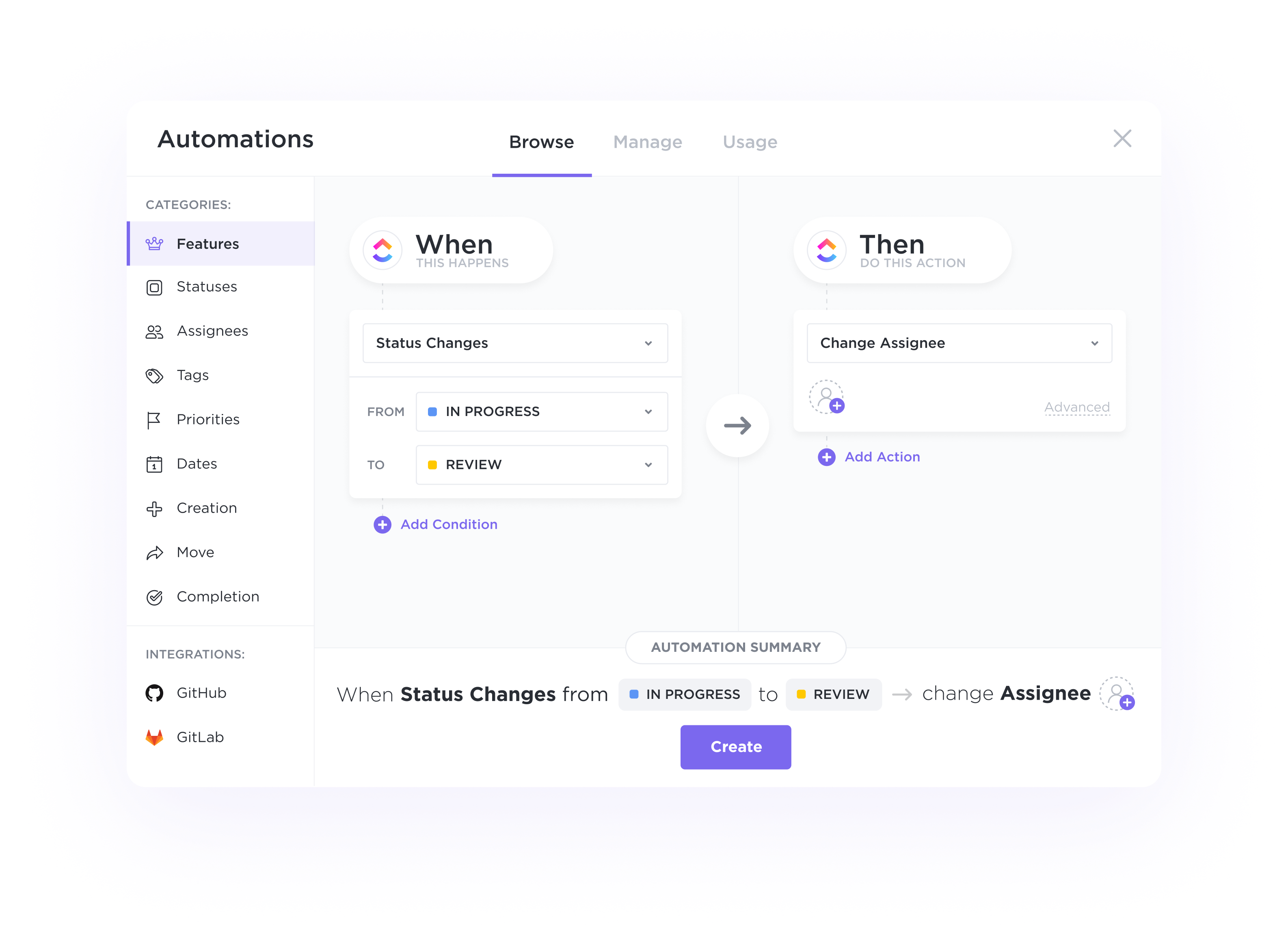Automations
Automate handoffs, status updates, and more.
Automatically assign tasks for each stage of your pipeline, trigger status updates based on activity, and switch priorities to alert your team on where to focus next.

Gantt Charts
Customize your CRM system for Chemical Engineers effortlessly with ClickUp. Streamline your client interactions, track leads, and manage projects seamlessly on one platform. Elevate your customer relationships with specialized features designed to meet the unique needs of Chemical Engineers. Try ClickUp today and experience a CRM system that works as hard as you do.
Free forever. No credit card.
Automations
Automatically assign tasks for each stage of your pipeline, trigger status updates based on activity, and switch priorities to alert your team on where to focus next.

CRM Views
Manage everything from sales pipelines, customer engagement, and orders with ClickUp's 10+ highly flexible views. Easily track and manage your accounts on a List, Kanban Board, Table view, and more.

Chemical engineers can use a CRM tool to capture leads from industry events, online inquiries, or networking efforts. By scoring these leads based on criteria such as industry relevance or project requirements, they can prioritize follow-ups and nurture them through the sales process efficiently.
Visualizing where potential projects stand in the pipeline can help chemical engineers focus on high-value opportunities and track the progress of each project. This feature of a CRM tool enables better organization and prioritization of tasks, leading to more effective project management.
By analyzing customer behavior and preferences, chemical engineers can tailor their solutions to better meet client needs. A CRM tool can provide insights into past projects, customer feedback, and buying patterns, allowing engineers to make data-driven decisions and improve customer satisfaction.
Maintaining a centralized database of clients, suppliers, and partners can streamline communication and enhance relationships. Chemical engineers can track interactions, manage contact details, and map relationships within accounts to personalize their approach and strengthen business connections.
Automating repetitive tasks like project updates, client communications, or invoice generation can save time and reduce errors for chemical engineers. Workflow automation in a CRM system can streamline processes, increase efficiency, and ensure projects are delivered on time and within budget.
Chemical engineers often work on complex projects with large amounts of data. A CRM can help in organizing and centralizing project data, including specifications, calculations, test results, and project timelines. This ensures that all team members have access to updated information and can collaborate effectively.
Compliance with regulatory standards is crucial in the chemical engineering industry. A CRM can help in tracking and documenting compliance requirements, certifications, and audits. By setting up reminders and notifications, it ensures that the team stays on top of regulatory obligations.
Chemical engineers often work with multiple suppliers for raw materials and equipment. A CRM can centralize supplier information, track orders, manage contracts, and monitor supplier performance. This helps in optimizing procurement processes and ensuring timely delivery of materials.
Effective collaboration is key in chemical engineering projects that involve multiple stakeholders. A CRM facilitates project collaboration by providing a platform for sharing documents, communicating project updates, assigning tasks, and tracking progress. This enhances teamwork and overall project efficiency.
Safety is a top priority in chemical engineering. A CRM can store safety protocols, training records, incident reports, and emergency procedures in a centralized system. By ensuring easy access to safety information, it helps in maintaining a safe working environment and mitigating risks.
CRM software helps chemical engineers by providing a centralized platform to organize project details, client interactions, and communication. It also enables tracking project progress, managing client relationships, and streamlining collaboration for improved project management and client satisfaction.
Yes, there are CRM software options tailored for chemical engineers that can integrate with other industry-specific tools, enhancing efficiency and data management within the specialized field.
Chemical engineers should look for CRM software with features such as project management, custom data fields for technical information, integration capabilities with engineering tools, and analytics for tracking project progress and client interactions.